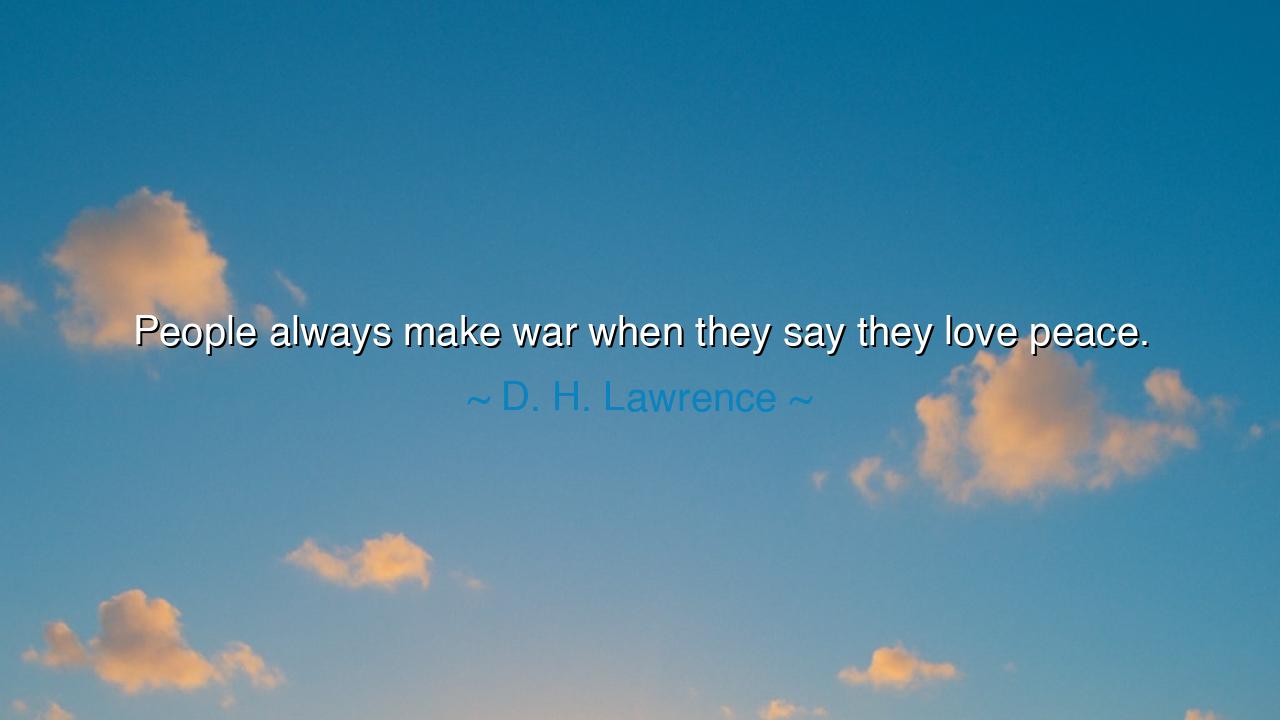
People always make war when they say they love peace.






Hear the piercing words of D. H. Lawrence, who declared: “People always make war when they say they love peace.” At first, these words may seem a riddle, a contradiction that cuts against common sense. Yet when the veil is lifted, we see a truth that has haunted humanity for ages: that often those who proclaim most loudly their devotion to peace are the very ones who prepare for war. Lawrence exposes the hypocrisy of nations and men, who cloak ambition and fear in noble words, even as they sharpen the sword.
Mark this well, O listener: the cry of “peace” has often been the rallying cry of rulers who seek dominion. They say, “We fight only to secure peace,” yet their armies march, their cannons roar, their banners of conquest unfurl. It is a dangerous illusion—the belief that violence can produce harmony, that destruction can give birth to order. Lawrence saw, in the aftermath of the Great War, how states justified slaughter by claiming it was for peace. But the peace they won was brittle, filled with bitterness and seeds of another war. Thus his words stand as both prophecy and warning.
Consider the fate of Rome. Again and again, its leaders proclaimed the Pax Romana—the Roman Peace. And yet, how was this peace won? By endless campaigns, by the crushing of nations, by rivers of blood spilled upon foreign soil. They spoke of order, of civilization, of peace under Rome, yet their legions never rested. Their so-called “peace” was war disguised, built not on harmony but on submission. Rome proved the truth of Lawrence’s words: men cry “peace” as they wield the sword.
Think also of World War I, called “the war to end all wars.” Leaders claimed they fought for peace, for the security of their nations, for the stability of Europe. But their treaties, their arrogance, their thirst for vengeance ensured that the peace won would soon give way to even greater conflict. Out of their desire to impose peace came the flames of World War II, proving once again that when men declare they fight for peace, war follows close behind.
But let us not think this truth belongs only to kings and rulers. In our own lives, too, the same spirit arises. A man may claim he seeks peace in his home, yet he dominates his family with harsh words and rigid control. A people may claim they desire unity, yet they silence voices of difference in the name of harmony. We too can fall into the trap of waging war in the name of peace—crushing rather than reconciling, forcing rather than forgiving.
And so, O seekers of wisdom, what lesson must we take? It is this: peace cannot be imposed by violence or by control. It must be cultivated with patience, humility, and compassion. If you truly love peace, do not march with the cry of war upon your lips. Instead, practice the harder path—the path of dialogue, of understanding, of forgiveness. True peace is not born of conquest, but of justice; not of domination, but of reconciliation.
Therefore, let Lawrence’s warning be ever before you. Do not trust every man who proclaims peace, but watch his deeds. Do not believe peace can be secured by the sword, for the sword only breeds more swords. And in your own life, do not confuse silence imposed by force with peace born of love. Seek the deeper way: to live justly, to forgive generously, to listen humbly. For only then will your love of peace be true, and not the mask of hidden war.






AAdministratorAdministrator
Welcome, honored guests. Please leave a comment, we will respond soon